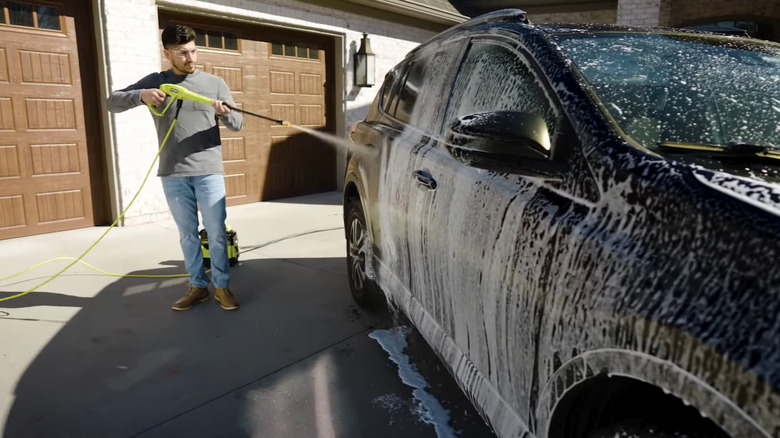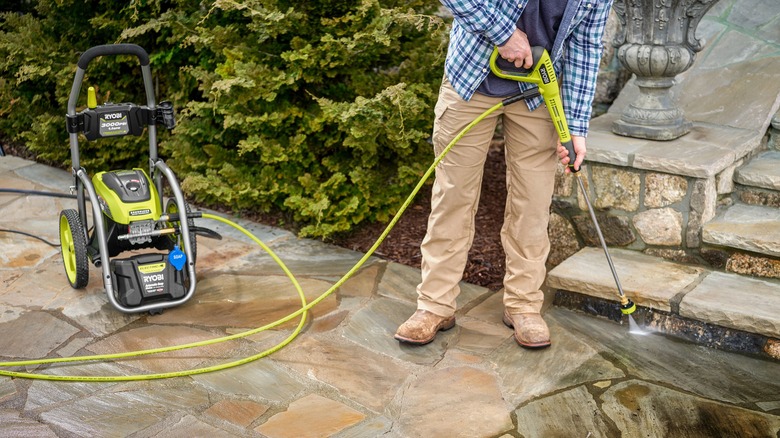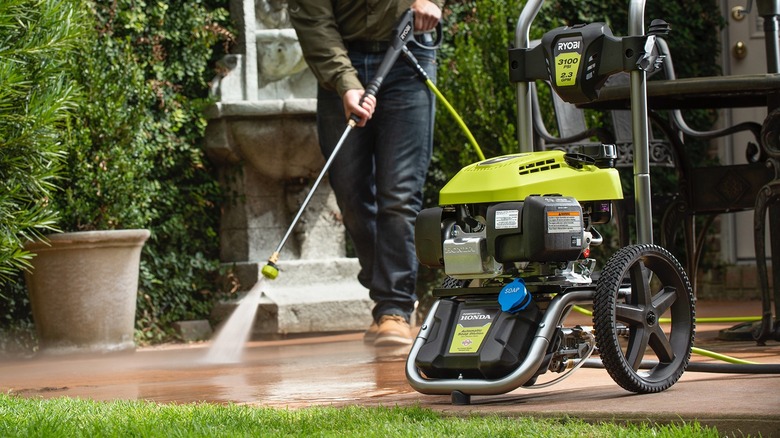Everything You Need To Know About Ryobi Pressure Washers Before You Buy
Ryobi has carved itself a path to being one of the best-selling brands of power tools in the United States. The array of products it offers — from drills and ratchets to generators and chainsaws — is quite impressive. With things like the 18V ONE+ battery system, it has created an easy-to-use ecosystem of tools that can bind a customer to Ryobi for a long, long time. Among the many different tools you can get from the company, one of them is a pressure washer.
Because it isn't a tool that chops or screws, it may be one that is a little out of sight and out of mind for some, but having a pressure washer at your disposal can make large outdoor cleaning jobs a much easier and streamlined process. These can be fairly expensive products, and picking out the right pressure washer for your needs can be something of an investment in a tool that you plan to use for a long time. Ryobi has over a dozen different pressure washers available that are able to cover many different needs, whether you need to wash a car, a driveway, or any other large, particularly filthy area. Let's break down what Ryobi has to offer in the pressure washer department and look into the little details you might want to know about.
Various power options
Traditionally, pressure washers ran on gasoline, just as a chainsaw or other high-powered tool would be. As we become a more environmentally conscious society, there has been a concerted effort made to reduce the amount of fossil fuel usage, and that extends out to power tools as well. Just as Ryobi offers some battery-powered chainsaws, the same is true for its pressure washers. Among the 14 pressure washers available, three of them run on a 40V battery, the same one that powers several of its chainsaws and other tools. These battery-powered pressure washers are lighter in their pressure output, with the maximum being 2,000 PSI. Even with that, these are some of the most expensive pressure washers Ryobi offers, with that maximum one retailing for $599.
Half of Ryobi's pressure washers are electric. Though they aren't as portable as the battery-powered ones, they still avoid harmful emissions. The power output range of the seven electric pressure washers is rather wide, as they can be as light as 1,800 PSI and go all the way up to 3,000 PSI. The price range is just as wide, with the 1,800 PSI pressure washer costing just $99 and the top-level 3,000 PSI one going for $399. For these, you are indebted to a power outlet, so make sure you are within range of an outlet or have proper extension cords.
For the traditionalists out there who need something heavy-duty, Ryobi also offers a few gas-powered pressure washers, all of which have an output of over 3,000 PSI. Electric or battery just can't get that kind of power quite yet. The prices for these are more in line with the battery-powered ones, ranging from $369 to $449.
Lengthy warranties
When you put down a few hundred dollars on a pressure washer, you would hope that you get some assurance that nothing is wrong with the model you purchase. You don't want to turn the thing on for the first or the tenth time and find that something is faulty with the motor, one of the attachments, or anything else. Luckily, Ryobi offers a pretty lengthy limited warranty for its pressure washers that will have your back if something goes haywire. While places like Harbor Freight offer a warranty for pressure washers that last just 90 days, Ryobi's lasts a full three years from the time of purchase.
Well, that three-year time frame is for the electric and gas-powered pressure washers from the company. If you purchase a battery-powered one, Ryobi ups that number to five years under warranty. That is for the tool only, while the battery and charger get the three-year treatment. Now, this limited warranty won't cover things like tune-ups or wear and tear on the machine, but if a part is defective in any way, you will be good.
When it comes to the gas-powered pressure washers, there is an important distinction that needs to be made. While the pressure washer is covered under a three-year warranty, the engine for it is not. That is covered under a separate warranty that lasts two years, so it would behoove those who go the traditional route to diagnose whether they are having an engine issue earlier rather than later. Two years is still a good amount of time, but better safe than sorry.


